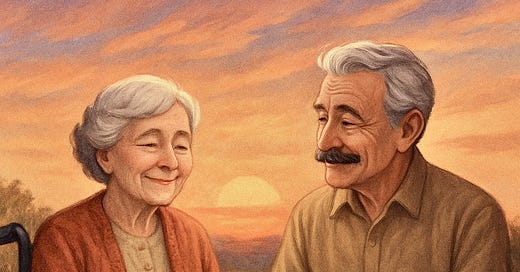Weekends are for leisure reading. As in fiction.
Once upon a time such leisure reading was a staple of American life and culture, best embodied by the Saturday Evening Post, which dates back to 1821 when its earliest editions were printed in Benjamin Franklin’s printshop.
From the 1920s through the 1960s, “America’s Magazine,” as it was known, reached two million homes every weekend. The Post was revered for short stories and literary serials, along with its cover illustrations of classic Americana by Norman Rockwell.
In that spirit, here is my own Saturday evening post.
1.
Elsa Peabody turns around to see who gripped her wheelchair—and immediately falls in love at the sight of a man she never laid eyes on before.
Mrs. Peabody hadn’t felt this way in nearly seventy years. It makes her feel slightly giddy, and suddenly much younger than her age of ninety.
Mr. Peabody had passed away four years earlier after 64 years of marriage to Elsa. However, only the first four held the kind of romance that caused goose pimples on her skin and butterflies in her stomach.
“Good morning,” says the object of her sudden affection. “May I steal you away and take you for a spin?” He looks directly into Elsa’s translucent blue eyes, whose pupils had dilated.
Her heart rate increases as she returns his gaze, wide-eyed, suddenly self-conscious of the flush she feels, resulting in a blush. She diverts her eyes to his hands, which tightly hold the rubber grips of her wheelchair. They are well manicured, if aged with liver spots. But whose hands and arms are not liver-spotted around Sunset Assisted Living?
“Thank you.” Elsa regains her poise. “Where to?”
She studies his features. Tall and lean, kind eyes, with an Errol Flynn mustache.
“Wherever you want to go, my dear.”
Elsa chuckles. The places she wanted to go, these days, could only be reached in her mind, or within the pages of a good book.
“I’d love a cup of tea,” she says.
“Then tea it shall be. My name is Miles Stewart. I’ve been meaning to talk to you since I arrived two weeks ago.”
“Why didn’t you introduce yourself sooner?” she asks.
Miles eases the wheelchair forward and turns it 80 degrees toward the cafeteria. “You’d think by the age of 91 I’d have conquered my shyness. But, no, I’m still a blushing schoolboy—albeit with a walker. And, frankly speaking, you are the first woman I’ve seen in this place that makes me even remember how shy I am.”
“So what finally compelled you to grab my roller?” Elsa asks.
“The realization that I’m on borrowed time.”
“Nonsense.”
“Maybe. But that’s the problem with retirement homes. They never let you forget that we’re in a waiting station for the train to eternal peace.” Miles draws Elsa’s wheelchair to a halt near a table, sits down opposite and fixes his eyes into hers. “Where have you been all my life?”
She chuckles. “I can only remember some of it.”
“I’d like to hear everything you remember. Start at the beginning, I’ve got all day.” He touches Elsa’s hand lightly with his own and feels her skin tingle. “Nobody visits any more.”
“Why not?”
“You haven’t noticed?” Miles pats what is left of his thinning gray hair, leans forward nearer and cups his right hand around his mouth as if to conspiratorially share a secret. “I’m old.”
Elsa laughs from deep inside. Later, when she thinks about it, she can’t remember the last time she’d laughed so happily.
From across the hall, Ernesto the duty manager, catches a glimpse of Elsa and Miles sipping tea, still gazing into one another’s eyes after over an hour of intense conversation.
“Here we go,” he mutters under his breath, plucking a ballpoint pen from his shirt pocket, jotting a snide note about “elderly infatuation syndrome” onto a clipboard he always carries. He lays it on the reception counter and strides purposefully toward the couple, pulling up behind Elsa’s wheelchair and grabbing its handlebars. “Time to go, Mrs. Peabody,” he says.
She turns startled. “But I haven’t finished my tea.”
Ernesto makes a show of consulting his wristwatch. “Meds,” he says loudly, as if she were deaf.
“The best medicine,” said Elsa, smiling at Miles, “is sitting across from me.”
“Meds,” Ernesto repeats, brusquely turning her chair before wheeling her away.
Miles raises his lanky arm in an attempt to say goodbye.
Though Elsa tries to squirm in her seat for a last look at her new friend, Ernesto catches the action and shuffles to block her view.




